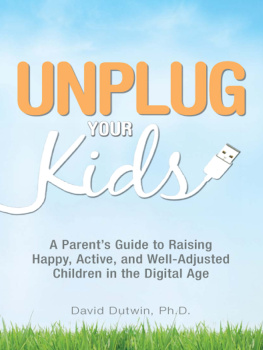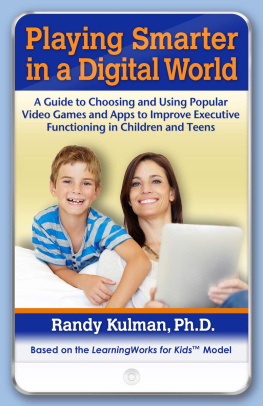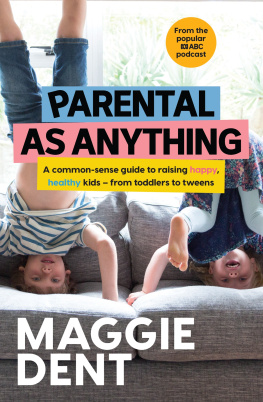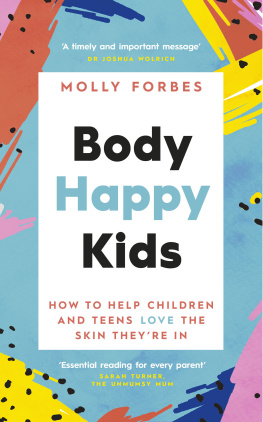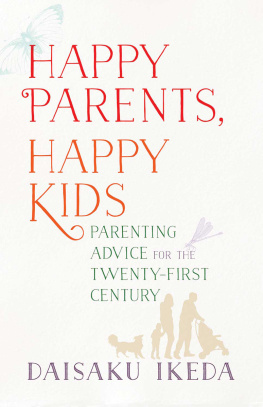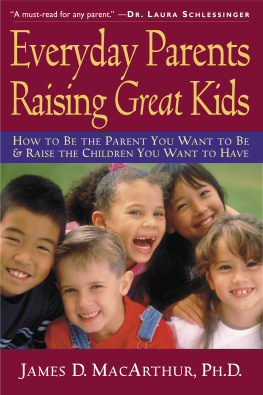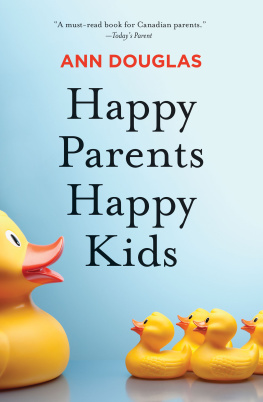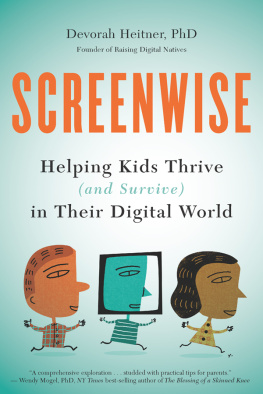UNPLUG
YOUR
Kids
A Parents Guide to Raising
Happy, Active, and Well-Adjusted
Children in the Digital Age
David Dutwin, Ph.D.

Copyright 2009 by David Dutwin, Ph.D.
All rights reserved.
This book, or parts thereof, may not be reproduced in any
form without permission from the publisher; exceptions are
made for brief excerpts used in published reviews.
Published by
Adams Media, an F+W Media Company
57 Littlefield Street, Avon, MA 02322. U.S.A.
www.adamsmedia.com
ISBN 10: 1-59869-804-4
ISBN 13: 978-1-59869-804-6
eISBN: 978-1-44051-836-2
Printed in the United States of America.
J I H G F E D C B A
Library of Congress Cataloging-in-Publication Data
is available from the publisher.
This publication is designed to provide accurate and authoritative information with regard to the subject matter covered. It is sold with the understanding that the publisher is not engaged in rendering legal, accounting, or other professional advice. If legal advice or other expert assistance is required, the services of a competent professional person should be sought.
From a Declaration of Principles jointly adopted by a Committee of the American Bar Association and a Committee of Publishers and Associations
Many of the designations used by manufacturers and sellers to distinguish their product are claimed as trademarks. Where those designations appear in this book and Adams Media was aware of a trademark claim, the designations have been printed with initial capital letters.
This book is available at quantity discounts for bulk purchases.
For information, please call 1-800-289-0963.
Contents
Acknowledgments
WRITING A BOOK means that other things must be pushed aside, which subsequently means, when one is raising two very young boys, that someone has to take up the slack. As if she wasnt already! But suffice to say, thanks to my wife Betsy for taking up the slack! Some of you may appreciate the fact that, well, two boys are a handful! Thanks to my mom as well for the background work and grammatical review.
A book like this is a rarity. It is so much easier for publishers to play it safe and publish the books that have the flashy titles and the extreme points of view. Such books are so much easier to market and sell. It is much more difficult to publish a book that eschews the lure of fast money with quick headlines, and instead tells the ugly truth: Life is complicated. And the effects of the media on your children is no less complicated of an issue than most other issues you face throughout life. But there is clarity in knowledge.That is what this book is about: Infusing you with knowledge on the bad and the good of the media and children, regardless of whether it produces flashy headlines. This book tells readers the simple facts in a straightforward way and offers advice that works for working folks. Its a much tougher sell, and I am thankful Adams Media saw fit to take on the challenge and report the truth.
Introduction
AS A PROFESSIONAL research scholar, I have come to realize that I am a glutton for punishment, or at least, that is what my friends and family think. What I am speaking about is my pleasure reading of academic journal articles about research on children and media, as well as other topics. If you have never read or even seen an academic journal article, you probably want to keep it that way. They are dense, riddled with statistics, and probably even more often, written with the intent to confuse the reader; what academics call academic gobedellygook. No, these are not the Michael Crichtons of the world writing these articles. Bluntly put, there are a lot of incredibly talented researchers out there with less than desirable writing skills!
As a research scholar, I suppose I have become somewhat impervious to the bad writing. To me, discovering what people have learned, and learning about how they figured things out, is fun and exciting. So when I first got interested in the effects of the mass media on children, as a professional researcher, I went straight to the source: The academic journal articles and books written by people who actually did the research necessary to figure out what the media is doing to our kids.
What I found in the vast volume of research conducted on the effects of media on children is this: Kids of all ages consume quite a bit of media, and, mostly, they turn out just fine. There are certain aspects of the media that can teach kids all sorts of knowledge and skills and promote personal growth. And, there are certain aspects of the media that can hurt your children in a myriad of ways, from suppressing learning to stunting personal growth.
Let me be even clearer about that: The vast majority of children who watch a lot of television, play a lot of video games, and spend a lot of time with a computer turn out just fine. However, kids are not dice. You can go to Las Vegas and bet all you want on small odds to win it all, and there is nothing wrong with that. But if you are like most parents, you are always looking for ways to protect your kids. Do you really want to take risks with your childrens health and wellbeing? No, none of us do.
So how do you protect them? This book is written to provide you the answers. A message that runs throughout the book is that the first step in protecting your kids from any threat begins with knowledge about that threat. But furthermore, because a substantial amount of research finds positive effects of media on kids, you dont want to throw out the proverbial baby with the bathwater. Better to use some forms of media to advance your kids developmentally, while limiting other forms of media when needed to prevent possible stunting of their development. This book tells you when to worry, when to relax, how to protect, and how to promote. We all agree that the media can have a tremendous impact on children. Why not learn to maximize its positive effects and minimize the bad?
Given that if you are interested enough in this topic (and I think this topic is important enough that all parents should be interested), and you are reading this introduction, there is a chance you might have come across some other books that purportedly talk about this same topic. If so, I would like to give you fair warning that there are two types of people that tend to write these kinds of books, as I alluded to in my acknowledgments. The first is a researcher who sets out to find the truth. The second is the author who has it in their head that media is either the most wonderful thing that has ever happened to humankind, or is the worse thing to ever happen to young children. This second type of person is not interested in finding the truth, but rather is solely interested in forcing facts and statistics to conform to their way of thinking.
You, I hope, are reading this not because you already know it all. You dont want to be lectured; you want to be spoken to.You are reading this because you want the truth.
So, welcome to my book. I think you will find a lot of interesting and useful information here. Our goal is to figure out what we really should do as parents in our mediasaturated world, to understand this media as well as our children do, to protect them by informing ourselves about the things that could hurt them. We teach our children to ride a bike and drive a car in a safe way, correct? As so many exemplars have shown us, from Columbine and beyond, we need to treat media the same way we treat a car: with respect. We must also have an understanding that we cannot really control what our kids do with such instruments but we can instill in them the values to make rational and smart decisions when using such things.
Next page
